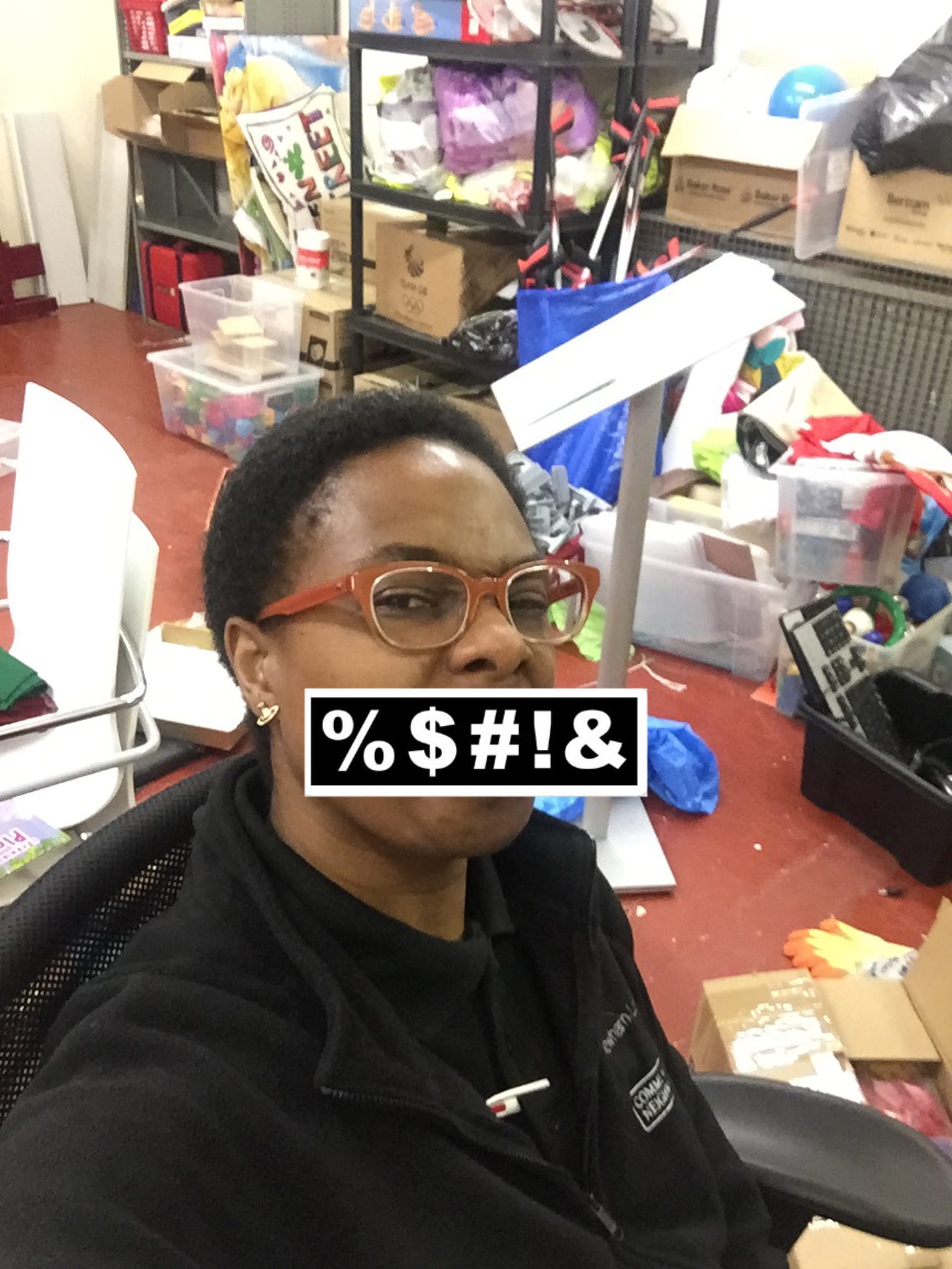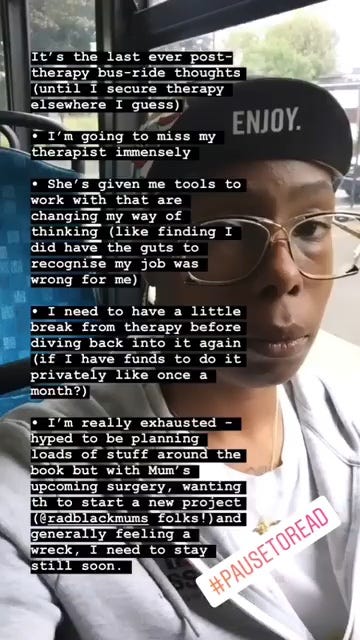Mental health is wealth... unless work makes that impossible... 🥴
A deep dive into what happens when workplaces crush your mental health instead of supporting it...
I’m not sure which PR Lists I’m on (or even how I end up on some of them), but at the beginning of this month, my inbox was awash with emails about World Mental Health Day and this year’s theme, ‘Mental Health at Work,’
The PR agencies sent me links to the dedicated World Health Organisation (WHO) website. There are a few key messages on it, and this is one which immediately got my attention:
“Mental health and work are closely linked.
A supportive work environment fosters mental health, providing purpose and stability. But poor working conditions can harm mental well-being, reducing both job satisfaction and productivity”.
As a lone freelancer, the optimistic PR requests that I “create inspiring World Mental Health Day content with my colleagues or employees” and share it on social media fell flat.
Still, the key messages on the WHO website about how employers should support people in the workplace with MH issues got me thinking about when I worked in various offices and the detrimental effect some of those work environments had on my mental health, leading me to go into therapy in 2019.
I’ve not talked much about that period, and the urge to write about it now is strong. So here we are.
J x

The first time I sought help for my depression and poor mental health was back in 2011. Reflecting on my initial experience, I see an odd brevity to it. Perhaps it’s because most GP appointments are only 10 minutes long, so that doesn’t allow for deep analysis with your doctor - but after a quick chat and a questionnaire, I was only offered medication as treatment.
Frankly, I didn’t have the mental stamina to question my doctor about it at the time: I was in a not-so-great place, and finding the energy to go into the surgery was exhausting enough.
I did as I was prescribed and popped my Citalopram daily. I spent weeks getting used to the meds I was putting into my body (boy, was that a wild and spaced-out ride) and spent no time speaking to a professional to get the intrusive thoughts that were swirling around my head out.
At some point, I knew this lack of ‘talking it out’ would probably come back to bite me on the arse.
It took seven years to feel that nip on my butt cheeks: by late 2018, things were far from rosy in my life. However, you wouldn’t know it - my toxic trait of making everything look fabulous to the outside world (especially with me bleating on social media about my book being published the following year) meant that no one knew I was rotting away on the inside. My job at the time had become a daily torment. Mamma Vélo was on the cusp of having major surgery and trying to arrange time off as her carer wasn’t going down well with my bosses. On top of that, finishing writing my book had become a joke.
Once again, masking the actual state of my mental health had caught up with me. I’d had enough of chewing myself up and accepted that I needed help.
I had to do something about it before I imploded.
I ruled out going back on Citalopram. I wasn’t totally against being on medication, as it helped me in the past. But I knew my mind, and I wasn’t in a place that required those drugs again. Also, already being behind on my book edit deadlines and spending weeks adjusting to the ‘I’m gonna take a nap right here’ side effects of those tablets (despite how sweet those deep-sleep sessions would have been) was a risk I couldn’t afford to take.
All I wanted was to talk to someone who was completely detached from my life and could sift through all the shit in my mind and, hopefully, help me make some kind of sense of it.
Not being made of money, the option of going private and probably getting an appointment with a therapist in a matter of days was not on the table. So, I put my faith in the NHS, braced myself for the potential waiting list agony and in October 2018, I referred myself to Talking Therapies.
I knew it would take some time because NHS mental health services are stretched beyond belief. Still, I’ve got to be honest - the wait for therapy when you’re already on the edge of losing it felt like being trapped in some kind of mind-bending purgatory. In May 2019, thirty weeks after doing my self-referral, I got a call confirming I’d been allocated a therapist.
You’d think I’d be jumping for joy at the news, but there were multiple factors as to why I couldn’t decide if the timing of said call was perfect or perfectly shit.
It came through as I worked my notice period at the library - ‘the job’ I mentioned earlier in this piece. It started well, but as you can read in this VeloMail from the archives, it went south at a rapid pace:
Call me paranoid, but it was hard not to believe my managers were on a mission to punish me for handing in my notice and the reasons that led me to do so. For the last four weeks, my usual front-desk assistant role—the one in my contract—became nonexistent.
I no longer worked in the library. During every shift of my notice period, I was regularly tasked with going outback to tidy the manager's office and file paperwork. In the final chapter of the story of ‘We Can’t Wait to See the Back of Jools,’ I was banished to the stock room (which was in an entirely different building and bigger than the actual library) to do the yearly audit of everything in there alone.
This would never be a one-person job, and the time of year they decided it had to be done was incredibly suspect. As I said, call me paranoid if you like, but I knew this was some bullshit.
I wanted to just keep my head down for my last set of shifts and get the hell out of Dodge, so I did as I was asked and sorted out the stock room. The only silver lining to being there was that it kept me away from the staff member (a significant contributing factor to my resignation) who had made my working life a misery for months.
When my phone buzzed with my local health authority's call, I was on my hands and knees on the dirty floor, sorting through old damaged books, children’s art supplies and random computer equipment. I sat down in one of the office chairs (broken, of course) that had been dumped in the stock room and cried. I looked at the mess around me: I was already feeling like rubbish, and all the junk in that room felt like a metaphor for the state of my career.
Instead of leaving the job the moment the red flags (and believe me when I say they were huge) started waving, I stayed for months longer than I should have. Not because I’d hoped the problems with this person would be resolved but because my options were limited, and I needed that job to survive.
“There were lots of things I bared my soul about to my therapist, but I was stunned at how much job and career talk there was, and how much my self-worth and mental health was intertwined with it”.
Behaviours like this had become a recurring theme throughout my misshapen career: I had developed a knack for remaining in jobs to the detriment of my mental health. The most visible example was my ‘big’ job in the cycling industry, contributing to my mini-stroke.
At the time of my self-referral, my (poor) career choices were not at the top of my list of subjects to talk about in therapy, but this latest working fiasco made me realise they were one of the things at the core of my unhappiness.
Another reason I couldn’t decide if the timing of my first appointment with Talking Therapies was great or grim was that it was pencilled in precisely a week before the publication day of Back In The Frame. In addition to the panic about once again waving goodbye to guaranteed income by leaving the library and trying to be fully freelance again, I was also twisting myself into knots about releasing my book.
I was nervous about my book release, and not just because I was terrified about myself and the pages of BITF being ripped to shreds in reviews. That whole ‘career thing as a writer’ was swirling around my brain, too. I had long harboured a dream that one day, I would write a book. When that came true, I hoped and prayed that there would be more books (not necessarily about cycling) to follow and my career as a bona fide author1—like writing full time and loving it and earning a decent crust from it—would be cemented.
There were lots of things I bared my soul about to my therapist, but I was stunned at how much job and career talk there was and how much my self-worth and mental health were intertwined with it.
People-pleasing and doing what was ‘expected’ of me weighed heavy on decisions I made in life in ways I could have never imagined. This wasn’t just about pleasing family members (well, my dad, specifically), demanding that I study a ‘proper’ degree and get a relevant job after graduating. It was also stuff like not wanting to be a failure in each job I took on and desperately trying to prove myself to various horrible bosses who honestly couldn’t give a rat’s arse about my presence.
Perhaps my desire to impress these bosses was deep-rooted in something else (yes, this was discussed and explored with my therapist). I’m still haunted by one boss telling me while away on a photography shoot that I needed to “prove myself worthy” to them before they’d consider including me in one of the group cycling photos. Throwaway comments like that, as ridiculous as they sound, can leave a lasting effect.
Another of those messages on the WHO Mental Health Day website which caught my eye was this:
“Taking care of your own mental health.
Although governments and employers have the primary responsibility to protect and promote mental health at work, you can take steps to support your own well-being. Learn techniques to manage stress and stay mindful of changes in your mental health. If needed, reach out for support from a trusted friend, family member, colleague, supervisor, or health professional”.
Taking steps to support my well-being in the workplace (or, instead, the workplaces I experienced) meant stepping away from them altogether, even though that meant embracing the financial uncertainty of freelance life, which had to be better than waking up every morning filled with dread about what awaited me at the end of my commute.
Even when I removed myself from those toxic work situations when I went freelance, the unfortunate nature of comparing myself to other, more successful peers—which made me feel like a terrible boss of myself—was (and, being honest, still is) a problem.
The WHO highlights that with “60% of the global population in work, urgent action is needed to ensure work prevents risks to mental health and protects and supports mental health at work”. I appreciate the World Health Organisation's good intentions in making ‘Mental Health at Work’ the theme for this year and platforming the need for more significant support. Still, how deeply that got me thinking about those who have experienced the opposite of feeling supported at work is wild.
This somewhat different edition of VeloMail feels like an extension of my ongoing struggle to balance work, life, and mental health despite making drastic changes along the way.
I just hope that if I ever step back into that arena again (and never say never; freelance life is a financially wild and unpredictable ride, friends!), I’ll remember my thoughts from my last ever Talking Therapies session in 2019 (as illustrated in the photo above) and the excellent tools my therapist armed me with.
Buy my book: Back in the Frame: Cycling, belonging and finding joy on a bike.
Find and follow me on Instagram and Threads.
I can write a VeloMail about how that’s going, but we’ll get to that later.










Ooooooh this so relatable as I've also had to access local NHS supported talking therapy after work decimated my mental health. Counselling was so helpful to me to me to build back up my self worth and identity, which had been so tied up in my job roles. I was able to realise that even though I was really good at my job the whole culture in the industry was not one I was ever going to fit in with and be comfortable in and definitely no longer deserved my time and effort.
Still making big changes over a year after I left the industry and still figuring out what I am going to be doing next to be able to keep paying the bills, but it definitely won't be working in a laboratory!
Ooof, I felt this, Jools. Particularly this:
"There were lots of things I bared my soul about to my therapist, but I was stunned at how much job and career talk there was and how much my self-worth and mental health were intertwined with it.
People-pleasing and doing what was ‘expected’ of me weighed heavy on decisions I made in life in ways I could have never imagined."
Hard relate. Thank you so much for speaking so candidly about this subject, it is SO important x